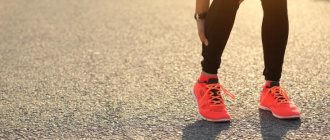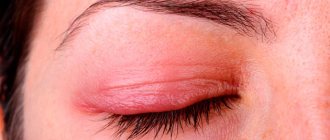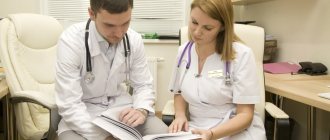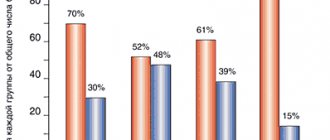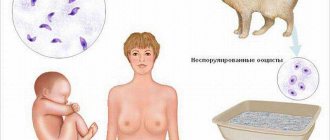Runny nose. Is it that simple? A runny nose leads us by the nose in the most brazen way. Exhausting. Brings you to tears. Is it really impossible to do anything about this and the only reliable remedy for it is a handkerchief? There is an old joke: if a runny nose is treated, it will go away in a week, and if left untreated, it will go away in 7 days. So why is medicine, which has achieved serious success in the fight against many serious ailments, unable to cope with such a seemingly trivial matter as a runny nose? It turns out that our immune system simply cannot recognize the next rhinovirus, because there are more than a hundred types of them! Plus, runny nose viruses are considered the most persistent among their fellow viruses and are able to cleverly “disguise themselves.”
Coronavirus symptoms
The most common symptoms of the disease include:
- high body temperature;
- difficulty breathing, dry cough;
- weakened immunity, lethargy;
- pain and discomfort in the chest;
- stomach upsets (in rare cases).
All symptoms can be combined into several groups, depending on the stage of the disease:
- subclinical - do not require medical treatment. They are almost never detected because the carrier of the virus feels well;
- respiratory – sore throat, body temperature stays within 37, headache;
- flu-like – muscle weakness, general malaise, very high body temperature;
- critical condition - pulmonary edema (most often it is necessary to connect the patient to artificial ventilation).
According to WHO data, only 5% of those infected with coronavirus had a runny nose. The majority of those infected did not experience problems with snot and nasal congestion. Therefore, with Covid, a severe runny nose is almost impossible. But since coronavirus is a very specific and not fully understood disease, each person may have their own symptoms.
Diagnosis of a runny nose
Examination by an ENT specialist
In order to correctly establish a diagnosis, an otolaryngologist performs a visual examination, palpation, laboratory and hardware diagnostics. As a result, the causative agent of the disease is identified, the degree of damage to tissues and organs, and the general condition of the patient are assessed. The most appropriate treatment is prescribed.
Rhinoscopy
(
Endoscopy of the nasal cavity
) is a classic instrumental ENT examination of the nasal cavity and nasopharynx using a rhinoscope. In some cases, an x-ray of the sinuses is performed, which allows the most correct diagnosis to be made and the disease to be correctly differentiated from those with similar symptoms.
Laboratory examination of rhinorrhea
To identify the pathogen, a general blood test may also be needed in some cases.
Allergy testing
allows you to identify the allergen leading to the development of symptoms.
How does the disease progress?
The incubation period is 2 weeks. During this period, a person is a source of infection, while completely unaware that he is sick with coronavirus. Afterwards, the disease can be asymptomatic, mild, or progress to a more severe form.
The clinical picture in many patients is as follows:
- 1-3 days – there is an increased body temperature, a dry cough appears, there may be an upset stomach and muscle weakness;
- 4-6 days – difficulty breathing;
- Day 7 – the condition may improve or worsen noticeably;
- 8-10 days - if the condition worsens, the disease begins to progress, difficulty breathing appears, you should immediately consult a specialist;
- 11-12 days - the patient is placed in a hospital department where there are also infected people. Symptoms include pain in the abdomen;
- Day 13 – the patient should feel better.
When the patient begins to recover, he should remain in the hospital for another 4-6 days. The cough will continue for another 10-12 days. It will take about 3 weeks for a general improvement in well-being.
Prevention of rhinitis
There are no special secrets in preventive measures.
Temper yourself, lead a healthy and active lifestyle, eat right, and don’t forget to rest. Carefully monitor the cleanliness of your mouth and nose, carry out sanitation, and seek medical advice and help in a timely manner. Be sure to treat your teeth on time. Try to avoid hypothermia, overheating and overwork. Take care of your nose, avoid negative chemical and mechanical effects. Regular walks in the fresh air in the forest, park, sports, and breathing exercises are recommended. Then you will always breathe freely, feel all the charm of the surrounding aromas and enjoy life to the fullest!
Nasal discharge due to virus
In order not to panic ahead of time, it is worth knowing what color the mucous discharge from the nose is. Coronavirus is not characterized by green snot, which occurs with bacterial diseases. With Covid, there may be a slight clear discharge from the nose.
Bloody discharge from the nose
During the spread of the disease, bleeding can be scary. Many people are wondering whether Covid can cause bloody snot. To date, not a single case of bloody discharge from the nose has been recorded due to coronavirus infection. But you should not ignore such a problem, since this may be a signal of serious problems in the functioning of the body. If snot with blood appears, you should immediately consult a doctor.
How and with what to treat a runny nose?
A runny nose is, first of all, a disease of the whole body as a whole. In medicine, each specialist focuses on his own area. But the vascular system and the mucous membrane of the respiratory tract are single functional systems, therefore treatment must be approached systematically at the level of the entire organism. Currently used therapy is often aimed at eliminating local manifestations, so its effectiveness remains low. All methods of therapy can be divided into traditional and non-traditional. Traditional therapy includes the use of pharmacological drugs, which are indispensable for some types of runny nose. First of all, these are modern antibacterial and antiseptic drugs. Thanks to some of them, it is possible, for example, to cure sinusitis without making a puncture. For allergic rhinitis, antihistamines, local hormonal drugs, etc. are used. However, in our age of “pharmacopoeia”, when the drugs used often have side and allergic effects, the method of drug-free therapy deserves close attention, therefore non-traditional methods of therapy are becoming increasingly popular: reflexology, herbal medicine , aromatherapy, breathing exercises. Reflexology methods include classical acupuncture, moxibustion, electropuncture, micro-acupuncture, and acupressure. In herbal medicine, both herbal medicines and herbal infusions and decoctions are used. The use of natural aromatic substances is of great scientific and practical interest. Aromatherapy is the therapeutic effect of plant essential oils on the human body. Priests and doctors used essential oils thousands of years ago. There are 188 references to oils found in the Bible. Essential oils have been found to have antiviral, antimicrobial, antifungal and antiseptic properties. The effect of essential oils on the psycho-emotional state of a person and the state of his defense systems is also known. In case of advanced runny nose or ineffectiveness of conservative therapy, surgical treatment is recommended. Options for operations on the nasal turbinates are different. It is necessary to adhere to the basic principle: “every patient has his own operation.” This can be submucosal vasotomy, ultrasound, laser, radio wave exposure, etc. The priority direction of our clinic in the surgical treatment of the runny nose is the radio wave method, the use of which can significantly reduce blood loss during surgery and the likelihood of bleeding in the postoperative period, and significantly reduces pain after surgery.
Identifying symptoms in children
Initially, doctors stated that children do not fall into the risk category and cannot contract the virus. But in reality it turned out differently. Absolutely anyone can get coronavirus, regardless of age. Symptoms in young children are identical to those in adults, but there are minor differences.
Children exhibit the following symptoms:
- pain in the chest;
- elevated body temperature (39 degrees and above);
- sore throat;
- dyspnea;
- wheezing in the lungs.
In children, coronavirus infection is often accompanied by a runny nose, while adults may simply have a stuffy nose without snot.
Treatment of a runny nose at the initial stage
As soon as the first signs of illness appear, it is worth reacting immediately and taking immediate action. You can do this by taking a hot bath for your whole body or just your feet. You can use mustard powder and the well-known Chinese starfish for foot baths. You can also breathe in its vapors, but not for too long. Then you should drink hot tea with herbs, honey and raspberries or lemon. Decoctions of blackcurrant leaves also help well. You can rinse your nose and mouth with infusion of chamomile or calendula. After taking warming water procedures and tea ceremonies, bed rest is recommended. Wrap yourself in a blanket, you can put woolen socks on your feet. Rubbing the soles of the feet with warming substances helps: camphor alcohol, Zvezdochka balm
, various warming ointments. Taking a loading dose of ascorbic acid will help boost immunity and quickly cope with infection. However, be careful as allergic reactions are possible. Take more fluids, plain water, juices, fresh juices, herbal teas and more. This promotes the rapid elimination of toxins, increasing the body's immune strength and speedy recovery.
What kind of runny nose happens with coronavirus?
Doctors assure that a runny nose is far from a 100% indicator of infection, but it cannot indicate the absence of illness. Snot discharge can occur with many other colds.
Types of mucous secretions:
- complete nasal congestion, when breathing is very difficult and there is “thick” snot - most often a symptom of a cold;
- snot with bloody discharge - often appears if the air in the room is very dry or a person blows his nose often and forcefully, as a result of which the walls of the vessels in the nose burst;
- snot with purulent impurities - may indicate sinusitis or sinusitis.
Possible cases of sneezing and mucous discharge from the nose due to the virus are associated with irritation of the nasal mucosa - penetrating harmful bacteria affect it.
Most people exhale with relief when they learn that Covid proceeds without snot. But in such a difficult situation, it does not hurt to be aware of all the symptoms of a serious illness.
Causes of runny nose in adults
Inflammation of the nasal mucosa, accompanied by discharge from the sinuses, is caused by various reasons, these are:
- Hypothermia (cold runny nose).
- Penetration of infection (viruses, bacteria) into the body.
- Allergen exposure (household dust, plant pollen, animal hair, chemicals, etc.)
- Hormonal diseases, etc.
Rhinitis is an integral symptom of seasonal colds. At this time, you should be more attentive to your health, use high-quality modern medications for nasal congestion and to treat a runny nose, and prevent the development of a chronic form of the disease.
Sneezing with Covid
Sneezing is considered one of the main symptoms of ARVI and allergies. With coronavirus, sneezing does not have to be present and is much less common than a runny nose. If a person starts sneezing, this does not mean at all that he could have contracted the virus.
Considering all of the above, it can be argued that with coronavirus there is almost never snot. If such cases occur, then the nasal discharge is quite insignificant. It is worth taking into account all the symptoms before diagnosing yourself with Covid. If you detect at least one symptom of the virus, you should immediately contact a specialist.
Ways to fight a runny nose
There are many simple, affordable home remedies that can help relieve a runny nose. You can make drops of beets with honey, place onions in your ears and nose, mix a cocktail of carrot and garlic juice, drink wild rosemary with vegetable oil, or use any other recipe to your taste. You can do inhalations, place cups, glue mustard plasters, and arrange painful rinses. But today we have more convenient and effective means - sprays that are easy to buy at the pharmacy. One of these is Lazolvan Rino*, which has a high safety profile and will quickly relieve you of a runny nose for half a day (the effect of the drug lasts up to 10 hours)*. And the freshness of the additional ingredients of the medicine - menthol, eucalyptol and camphor - will give you a feeling of lightness and good mood!


